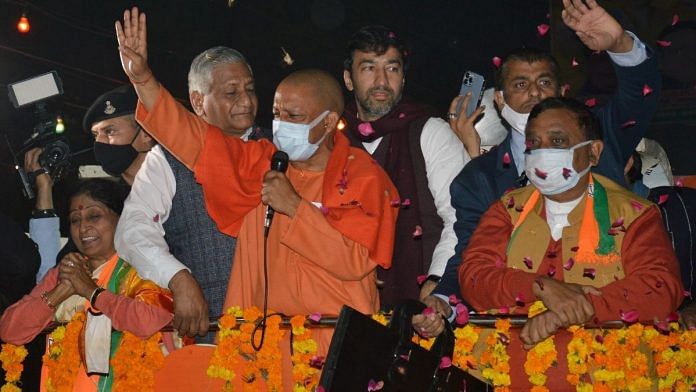The ensuing elections for the five state assemblies will be taking place in the background of some very significant and momentous events and circumstances. In the last round of assembly elections held in 2021, the BJP retained Assam and won an impressive number of seats in West Bengal, increasing its tally from 3 to 77 with 38.1 per cent vote share.
Yet the overall impression was that it lost three states (Kerala, Tamil Nadu, and West Bengal). This time the BJP has to work overtime to retain Uttar Pradesh, Uttarakhand, Goa, and Manipur, and additionally win Punjab. Like last year, this year too, the elections are taking place under the shadow of Omicron, which is assuming pandemic proportions. While there are strict restrictions on commercial activities, manufacturing units and other normal schedules, political rallies are likely to go on in a massive scale with thousands congregating abandoning all caution.
Farmers’ win is not an Opposition glue
One major difference in the two assembly elections is that the 2022 series is taking place in the background of the Narendra Modi government’s climbdown on the three farm laws that were touted as game-changers. The unique farmers’ protest was located in one area but attracted nationwide attention. The withdrawal of the laws was announced by the Prime Minister himself, giving an impression of retreat from reforms. Although the party and its sympathisers called it a tactical withdrawal, the opposition is certain to project it as a setback to the ruling party and victory of the combined opposition.
Ironically, not one single party from the Opposition is in a position to take credit for what is perceived as the farmers’ victory. In Punjab, former Chief Minister Capt. Amarinder Singh appeared to be in the forefront of taking credit for having suggested to the Union government about the need to climb down on the farm laws. This allowed the Aam Aadmi Party (AAP) to target him for holding secret parleys with the BJP. Meanwhile, Amarinder Singh himself has announced that he is in talks with the BJP for seat-sharing and a joint manifesto. The BJP will have an edge over others if this new alliance picks up steam as campaigning progresses. The Trinamool Congress (TMC) and the Nationalist Congress Party (NCP) don’t appear to be serious players as of now. They are in the race in Punjab as well as in UP only to increase their overall vote share.
As of now there is no strong alliance against the ruling party in any of the states due for an election. More importantly, alliances can succeed on two other factors; one, a strong leader acceptable to all parties, and two, a sturdy engine that could pull the bogies in the uphill task of defeating a strong leader and his party.
The continuous decline of the Congress since 2014, the absentee leadership at the top and the total lack of alternate vision has made other parties shun the Congress rather than rally around it. If at all any party is talking of aligning with the Congress, it is only to benefit from whatever is left of its vote bank. Alliance and coalition politics has always been one of the tried and tested tools to dislodge a strong party with absolute majority in the state or centre.
Also read: Congress fields Unnao rape survivor’s mother in UP polls, women form 40% of 1st party list
It’s unlike 1977 Congress defection
It is not very unusual for politicians to switch parties before or during the run-up to elections. But none of the current political exits and entries are as earth-shattering as the first shocking exit of Babu Jagjivan Ram in February 1977. His exit from the Congress was so dramatic and serious that it prompted Indira Gandhi to call it the emergence of a new alliance. In a way, she was right to conclude that an alliance was brewing against the ‘invincible Congress’ and its larger than life leader. Leaders from parties fiercely opposed to each other and representing castes and groups that were at loggerheads with one another merged their respective parties to form a single entity to defeat the Congress that was wielding unbridled power at the time. But then, the thread that bound them together was Jai Prakash Narayan (JP).
It is doubtful if any of the recent exits from the Bharatiya Janata Party (BJP) to Samajwadi Party (SP) in Uttar Pradesh or for that matter in other states can come anywhere close to the formation of a new alliance. The current ‘exchange of loyalty’, if one may call it so, arises out of considerations far removed from ideology or commitment to party policies. Most of the exits are based on calculations of caste vote bank, chances of winning and mostly on apprehensions of not getting a party ticket to contest from the seat of one’s choice.
If exodus from TMC to BJP did not help the latter in West Bengal, it is doubtful if such newcomers will help the Samajwadi Party in Uttar Pradesh. Besides, the Samajwadi Party is in a quandary. Akhilesh Yadav’s temple visits, pro-Brahmin statements and launching campaign from Chitrakoot may not get him Hindu votes, but may distance the Muslims vote bank from his party. Also, Bahujan Samaj Party supremo and four-time chief minister Mayawati’s silence is more than enigmatic with both the BJP and the Congress wondering which way her voters will turn.
Considering the total absence of a strong coalition against the BJP in the five poll-bound states, lack of anti-incumbency feeling, BJP’s usual high-powered campaign blitzkrieg, and a strong TINA factor, it certainly appears to be advantage BJP.
The author is the former editor of ‘Organiser’. He tweets @seshadrichari. Views are personal.



